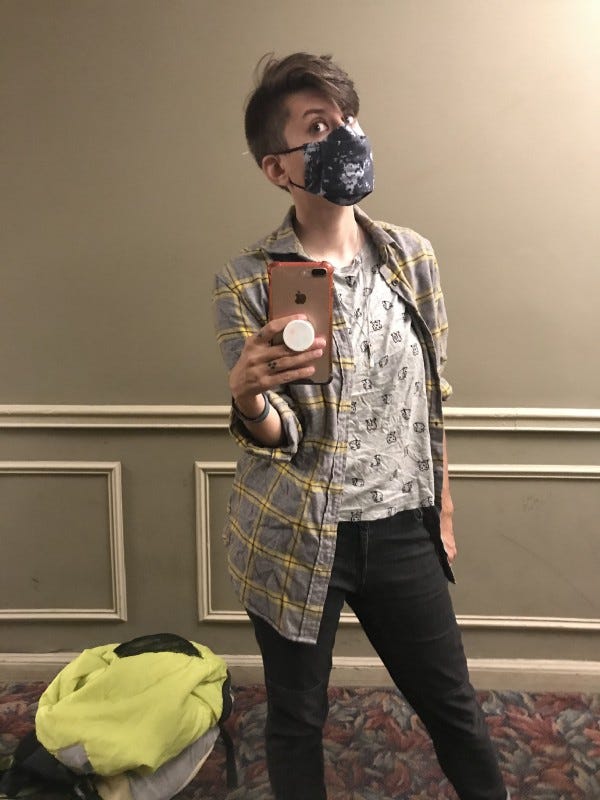Surprising Effects of Testosterone
T affected my allergies, eye size, perception of time, and more.
T affected my allergies, eye size, perception of time, and more.

I’m a nonbinary transgender person, and I’ve taken testosterone intermittently for years. In my case, I applied a half-packet of Androgel to my body every day, sometimes every-other day. At times, I took T consistently for months; other times I took weeks or months off of it entirely.
I have always been shooting for an androgynous, pretty-boy kind of appearance. I didn’t want to look fully or stereotypically “male.” I wanted a few of the obvious, well-known changes: a lower voice, a bit more muscle tone in my shoulders and chest, an angularity to my jaw. I didn’t want a beard, or male-pattern baldness; I didn’t want to be on T for so long that I’d need a hysterectomy. The plan was always to stop eventually.
A few months ago I determined that if I stayed on T much longer, my transition would progress past the point that felt comfortable. Too much body hair, skin that was far too rough and thick. So I quit applying Androgel, very abruptly.
In the months since stopping T, my body has returned to a more stereotypically feminine shape, and my periods have become more consistent. My emotions have a slightly different quality: less anxiety, more sadness. My allergies are back. My eyes are bigger-looking. My immune system is better. My feet are always cold. The hair on my body is more downy and soft.
Some of these changes might sound surprising to you. Many people know the broad brushstrokes of what T and E do to the body: how they impact body hair, muscle tone, breast development, and sex drive. But there are a panoply of other, lesser-known changes that happen, ones that many trans people are not informed about. I figured I’d take this opportunity to share some of them, while my body is slowly shifting from one hormonal profile to another:
Allergies
I’ve had allergies my whole life. As a kid, growing up with two pets who shed a ton of fur was brutal for me; I was constantly sniffling and snuffling. Pollen and dander, hay and dust all bothered me. I always had tissues on me. These allergies persisted into adulthood and didn’t abate by much. If I visited a home where there was a pet, I was a blear-eyed, sneezy mess for hours.
On T, that all went away. I had basically no allergies at all. I didn’t notice at first; life just suddenly was a bit more easy and comfortable in a subtle way. Then I spent a week at my mom’s house in Ohio, playing and cuddling with her daschund, which had always left me reeling with itchy eyes and a runny nose in the past. Suddenly, I could spend all the time with her dog that I wanted, and even go from petting him to touching my face and eyes immediately after, and nothing happened. Not one sneeze.
Research shows that testosterone can be used to reduce or resolve seasonal allergies. T also suppresses the immune response in people with allergic asthma. This suppressed immune system response can be a big negative in other ways — men get sick more easily, and tend to be hit with more intense symptoms when they do get sick. But when it comes to the immune system over-reaction that is having allergies, T can be a real balm.
For about two years, I had no allergies whatsoever. Going outside was not a problem for me on even the most high-pollen of days. In the past three months, my allergies have slowly returned. I’ve sneeze and sniffled and been uncomfortable out in the park or after handling my chinchilla’s hay. It’s been an oddly welcome return. It tells me my body is changing in the direction I was hoping it would, and it signals my immune system is kicking back into high gear, which could help protect me from COVID.
Eye Size and Shape
Hormones subtly affect how open and bright a person’s eyes look. No one is exactly sure how this happens, but one theory is that hormones modify how much fluid and facial fat the body stores near a person’s temples. If you’re on T, the fluid and fat seems to build up, making your skull look wider and your eyes narrower. For a person on E, this fluid and fat recedes, making eyes look big and alert. Every person’s results are different, of course, and not everyone gets this change in a striking way.
When I was on T, my eyes looked a bit smaller, and my temples looked wider. There was a slightly squinty, masculine quality to the upper half of my face. When COVID hit the United States and I started wearing a face mask, people assumed consistently that I was male. Even on days when I was wearing feminine clothing and not binding my chest, people saw the upper half of my face and figured I was definitively a guy.
That has changed in recent months. My eyes look larger and “prettier” now, and more round. I look more youthful. I’m also getting hit on more by random men — even though it’s mid-October and I’m always wearing a mask, a hat, and a thick jacket. They can’t see any changes to my body, and nothing else about my presentation has become more womanly. The only visible change I’ve made is that I have more feminine eyes.
Skin Thickness
Hormones affect acne. A lot. Despite the popularity of skin products that attempt to treat breakouts on the skin’s surface, the reality is most pimples are caused by hormonal fluctuations on the inside of the body. In trans circles, the impact hormone replacement therapy has on acne is very well known. Trans guys know to expect zits on their face, chest, and back. Trans women can look forward to clearer, softer skin.
A lesser-known effect of hormones (and one that is relevant to the acne issue) is that it can change the skin’s thickness. When your body has a lot of testosterone, your skin’s collagen fibers can actually become more dense, creating thicker, rougher skin. It is easier for oil to build up in pores, and for pustules to form, when your skin is thick like that. Thick skin also feels more rough and looks more “dull.” (This is sometimes mistaken for testosterone making skin slightly darker). Thin skin is more resistant to acne, feels smoother, and is sometimes described as looking more “bright”.
My skin was never “bad” on testosterone. I took a low enough dose that the breakouts were manageable. Still, I could see a change. Wrinkles on my forehead were more prominent. When I had pimples on my back, I could feel that they were buried deep beneath layers of dense tissue. It could take days for them to come to the surface. In photos my skin seemed a little grey.
Now that my body is estrogen-dominant, that has all reversed a bit. I still get some acne (especially before my period, when my body’s natural T levels are highest), but the zits are shallow in the skin, and quick to heal. My skin feels more bouncy and supple. I still look like the 32-year-old that I am, but if I drink enough water and remember to exfoliate once a week, my skin can look smooth and fresh. It always seemed a little rough when I was on T, no matter what I did.
Perception of Time
A few months ago, a friend told me about their theory that a person’s hormones influence how they experience time. People with high testosterone tend to feel as if time is moving quickly, they said; small slights and setbacks seem less important, details may not draw as much attention, and negative emotions seem inconsequential because time is always moving forward at a rapid clip.
Conversely, my friend posited that people with high estrogen perceive time moving at a more languid pace. Problems can feel like they must be resolved, because they aren’t going away. Details can loom very large. You feel as if you have more time alone with your feelings when you’re on E.
My friend’s theory felt intuitively true to me, though it was not an effect of hormones I’d ever been told about before. So I decided to dig into the research. I found that in fact, estrogen and testosterone have been found to influence how a person experiences time. When women are menstruating, their circadian rhythm is altered; several studies have shown hormonal fluctuations affect temporal perception in general. Even in studies of rats, estrogen and testosterone have been found to impact how the passage of time is perceived.
Perception of time is obviously a very complex thing, involving a variety of neural substrates, physical cues, and environmental factors. Still, my experience of stopping T does line up with my friend’s theory. When I was on T, I was high energy and anxious about getting things done. I’ve always been impatient and driven, but on T the urgency was even more intense. I found it easier to move on when things went poorly; sadness and grief stayed with me less. I didn’t get bored very often, because time seemed to fly by.
As soon as I stopped taking my Androgel, a slow, contemplative kind of sadness settled over me. I was able to really sit with my bad feelings, and dwell on them more. When people I cared about were struggling or sad, it bothered me for a much longer period. The hours seemed to stretch on and on, and I became capable of boredom again.
On the whole, I’ve enjoyed returning to a slower pace. I experience way less stress. It feels healing and meaningful to really let myself wallow in bad feelings when I need to. Life on T was too frantic; life on E is slower, sadder, and more lush with detail.
…
It’s been really fascinating to shift from an estrogen-dominant body to a testosterone-dominant one, and then back again. Hormones influence so much about us, yet their impact is both overstated and oversimplified. Some of the most significant changes I’ve experience on HRT are the ones nobody told me to expect. T didn’t make me into a sweaty, hairy rage-o-holic, but it did make it possible for me to pet dogs without sneezing. Now that I’m off T, estrogen hasn’t turned me into a sensitive, weepy mess, but it has made me more thoughtful about the sadness I’ve always experienced.
In most ways, I am the same person now as I always have been. T and E never really changed my personality or experience of reality all that much. Still, I’ve found it oddly comforting to quit supplemental hormones and return to some of my body’s more “feminine” traits. Those feminine traits just aren’t the ones people would expect. I like the sneezing and having a strong immune system. I like my big eyes. I prefer having pimples that are easy to pop. These traits aren’t the ones I had in mind when I stopped T, but I’m happy to have them. They’re part of what makes me who I am — at least for now.




